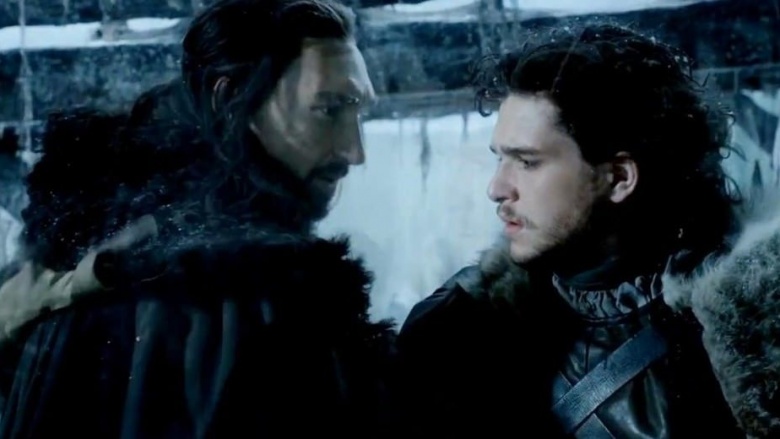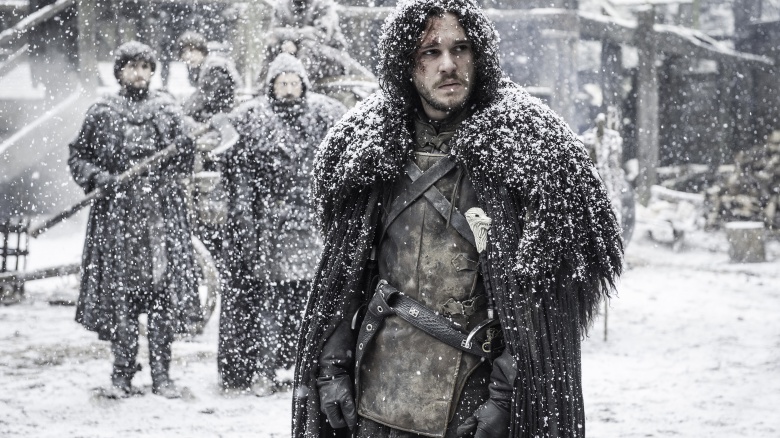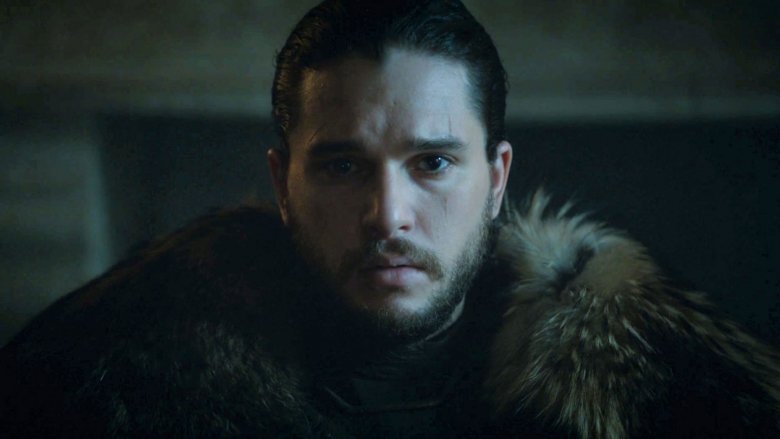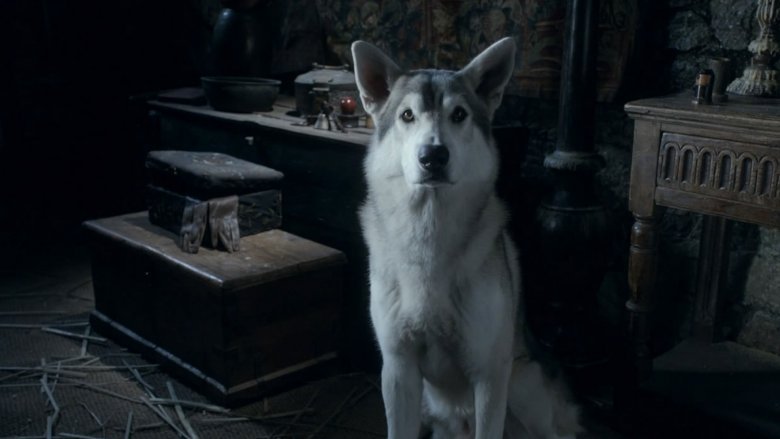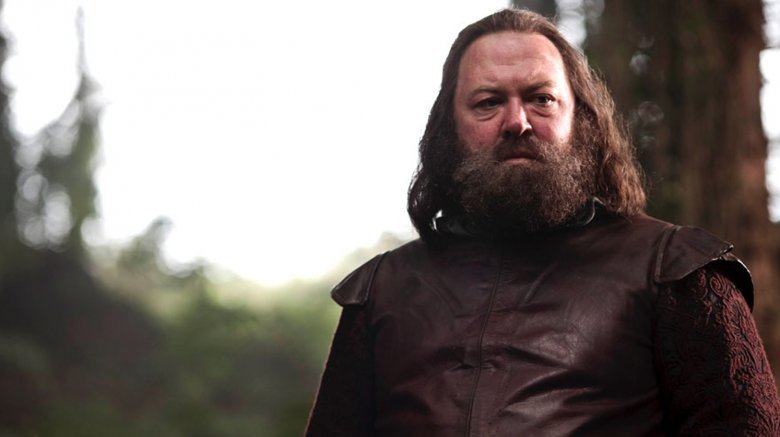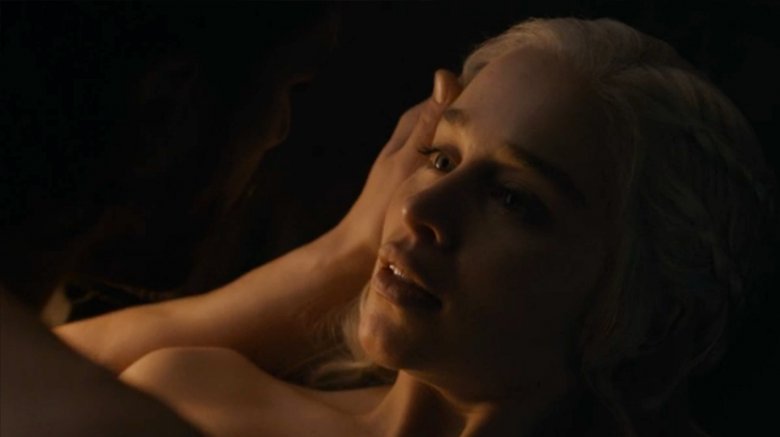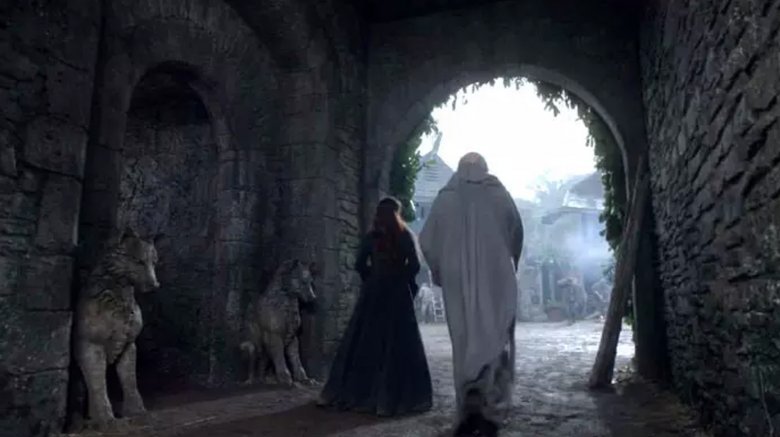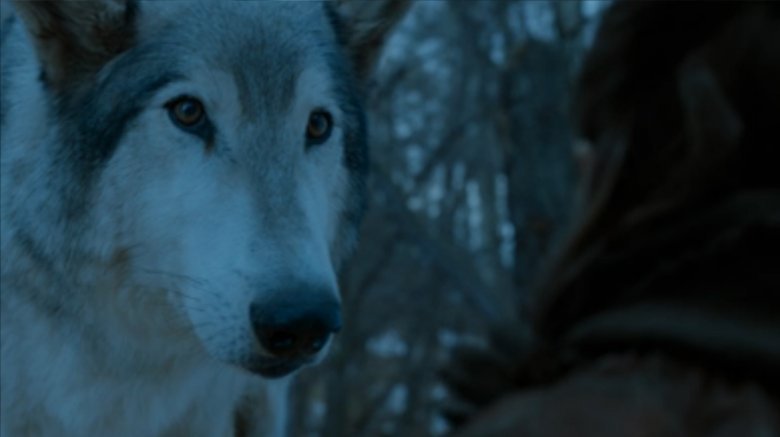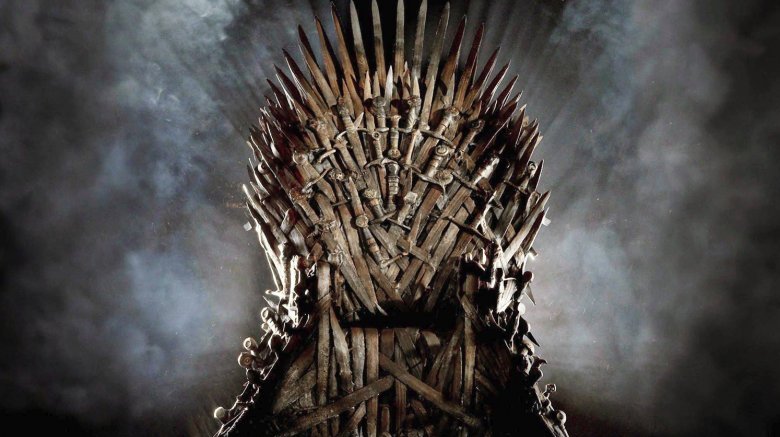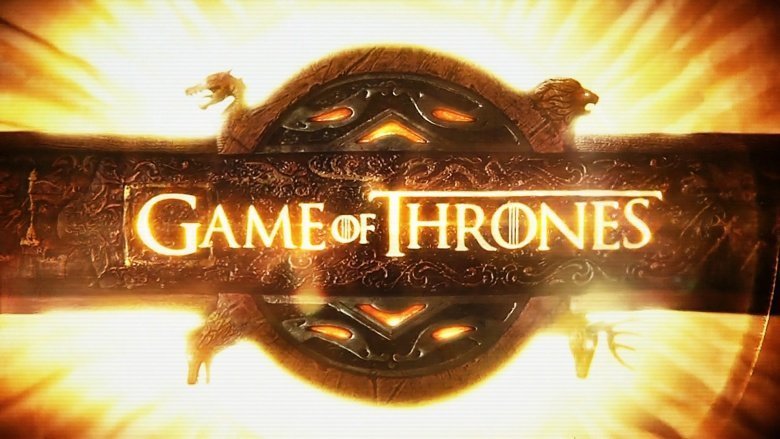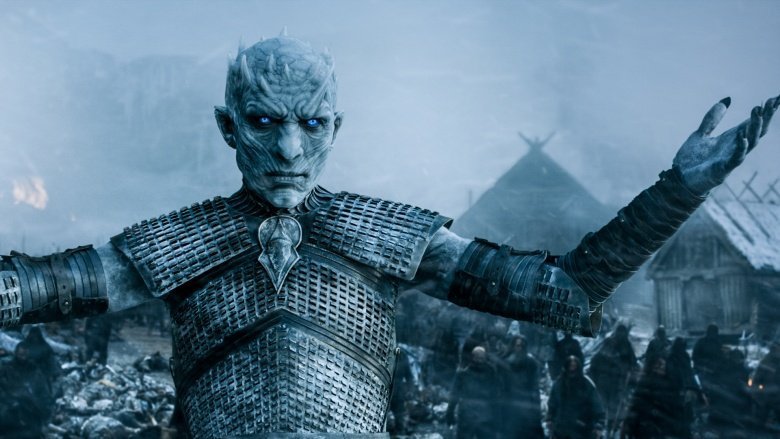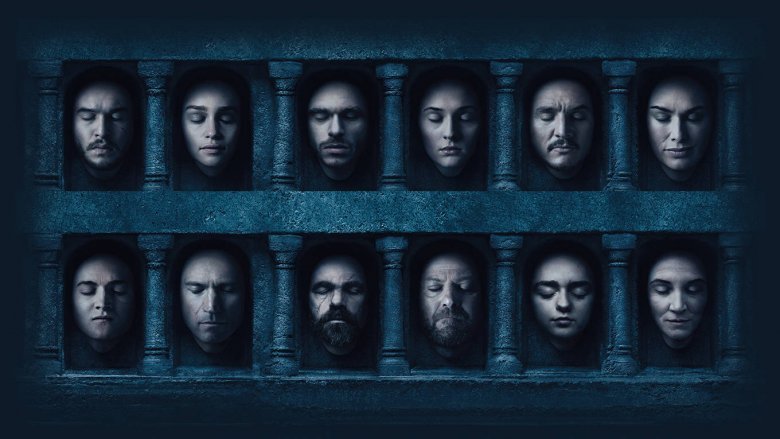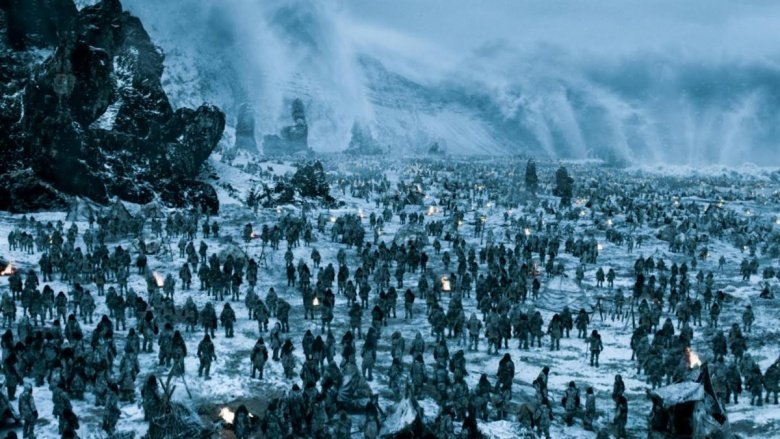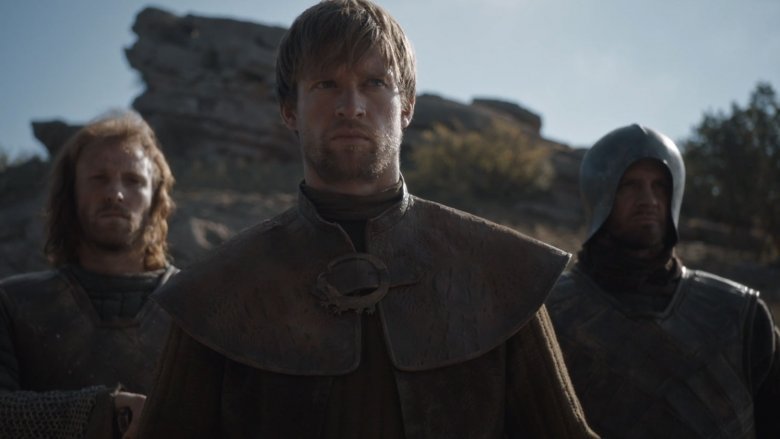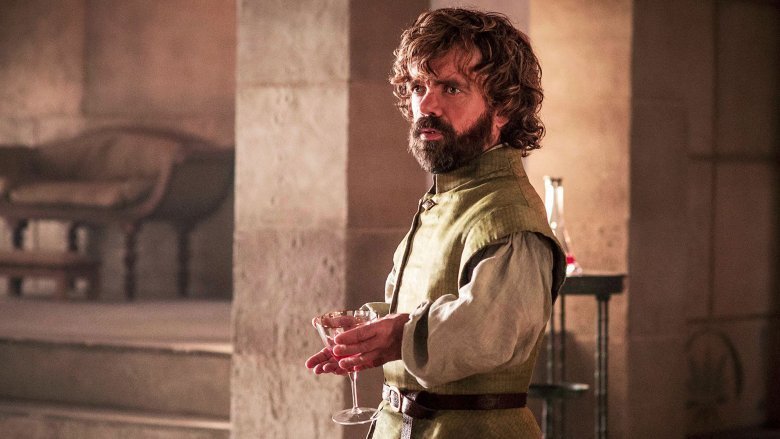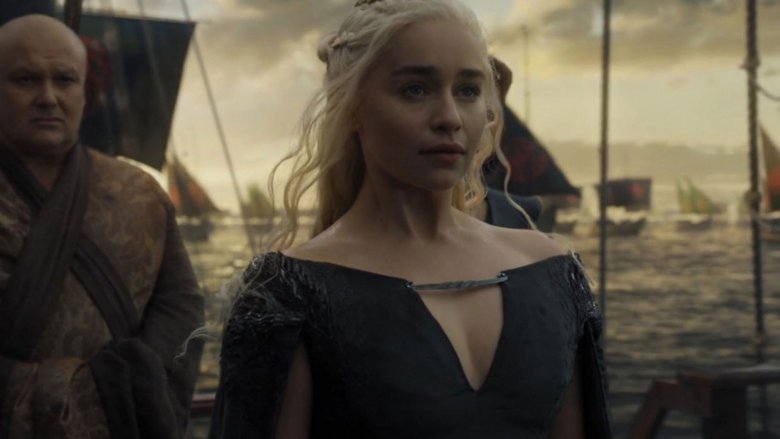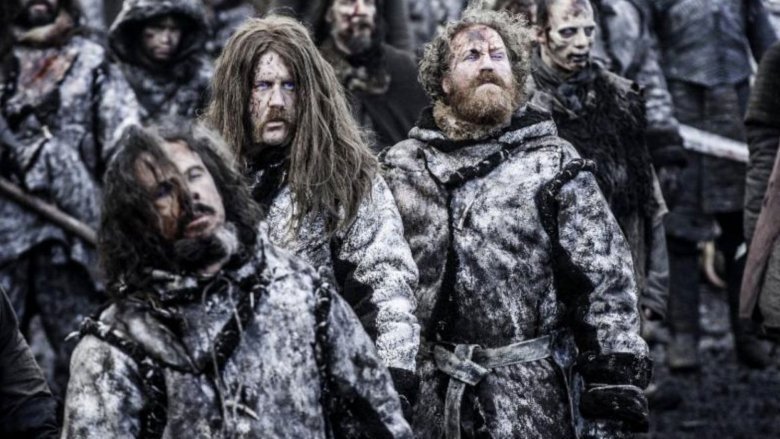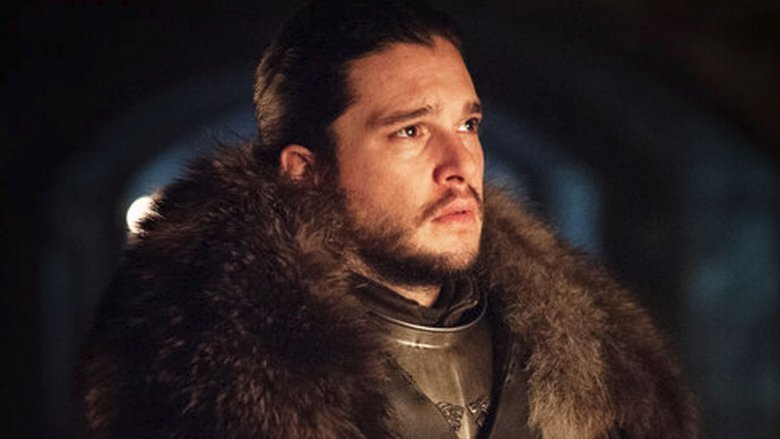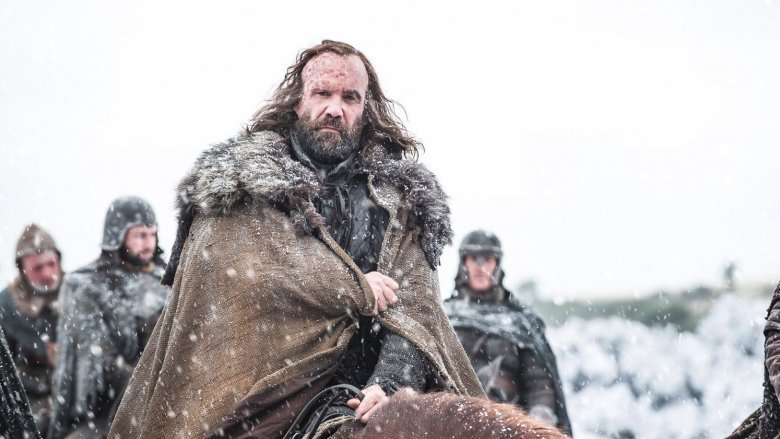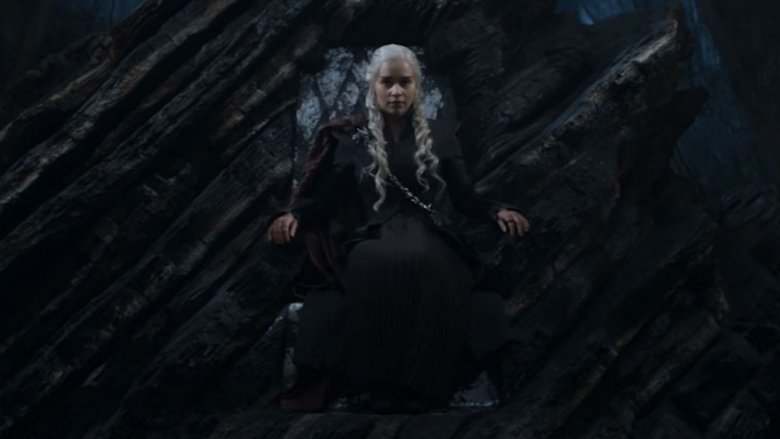'Game Of Thrones' Mysteries That Have Yet To Be Solved
Benjen Stark, Jon Snow's beloved uncle, showed up in the beginning of the first season, went beyond the Wall, and has not been seen or heard from since. And for a guy so close to the show's main character, he's barely been mentioned on Game of Thrones. He got a quickie shout-out in Season 2, the Watch used his name to lure Jon to his death, and that's it. But that can't be it, right? No story this deep and detailed would simply ignore an entire character aside from the occasional "oh right, him" reference. We need to know more about Benjen and his fate, and the only real debate should concern when we finally see him again, and what happened to him. Does he have a tribe of Wildlings at his command? Is he a White Walker? Or did he make his way back south and is now somewhere in the shadows, waiting to take revenge against a Watch he feels abandoned him? Whatever it is, he's almost certainly alive—sure, few southerners survive beyond the Wall for years on end, but it'd be awful anticlimactic to bring him back after all these years and just give us, "Welp, he's dead, roll credits."
Who is Jon Snow's mother?
Jon Snow has a mother, obviously. But we know exactly one thing about her: her name was Wylla. Aside from that, we've gotten absolutely no details about who she was, whether she was important, what family she came from, or how she won Ned Stark's heart (for a night, anyway). It seems odd to dismiss her as a mere random conquest, since this is an epic story—and in epic stories, most characters wind up serving some sort of critical narrative purpose. With that in, Wylla is probably going to wind up being a member of a prominent family, which would give Jon Snow connections to both the Starks and X Family, perhaps making him the reason these families finally begin to stop squabbling, fighting, and killing so much. Unless the White Walkers get to him first, that is.
As GoT readers are aware, the books do go into more detail about Wylla, casting her as a servant of House Dayne. But HBO has repeatedly proven they're not afraid to deviate from the books if it helps their version of the story. So in this parallel Westeros we watch for ten Sundays a year, Wylla could be anybody, from anywhere. But one thing she surely isn't is a nobody.
Is Jon Snow still a bastard?
In the final episode of season six, fans finally had the answer to one of the most long-debated questions from Game of Thrones lore: who are Jon Snow's real parents? In a flashback scene with Bran revisiting the Tower of Joy, the show revealed that Jon is indeed the child of Lyanna Stark and Rhaegar Targaryen, not Ned Stark and an unknown woman. One major mystery wasn't resolved, however—were Lyanna and Rhaegar married before Jon was born, or is he still a bastard born out of wedlock? Oh, and by the way, what is Jon's real name? If his parents were married and he's a trueborn son of Prince Rhaegar, that would put Jon in line for the Iron Throne before Daenerys, who is Rhaegar's sister.
While Rhaegar was already married to Elia of Dorne when he absconded with Lyanna, polygamy wasn't unheard of among the Targaryens of old. The only living people who might know the truth of this mystery are Littlefinger or Varys—who deal in exactly this kind of secret information—or Ned Stark's bannerman and best friend, Howland Reed. It's also possible that the truth could be revealed to Bran through another flashback scene, perhaps showing us a secret wedding ceremony between the couple.
What happened to Nymeria?
In case you need a refresher, Nymeria was the direwolf owned by Arya Stark. Onscreen in the series, we haven't seen Nymeria since Arya was forced to chase her away during S1E2, "The Kingsroad." In the books, we're given some strong hints that not only is Nymeria alive and well, but she's leading a huge pack of wolves in the Riverlands. Nymeria also finds and pulls the body of Catelyn Stark from the river following the Red Wedding. HBO also chose to ignore the development of Arya's warging skills from the books, as she frequently finds herself seeing through Nymeria's eyes in her dreams.
Even though the show has left out this major plot point, that doesn't mean all hope is lost for a reunion between Nymeria and her owner. In recent filming news from the set of season seven, Maisie Williams was spotted shooting for Thrones in Canada, around the same time as Instinct Animals, the company that provides wolves for the show. One major clue points to Nymeria's return: in addition to Quigley, the white wolf who plays Ghost on the show, the company was also working with a grey and brown wolf. Given that all the other Stark direwolves are dead except for Ghost and Nymeria, and this wolf resembles Nymeria, it seems likely we'll see Arya reunite with her beloved pet in season seven.
What really caused Robert's Rebellion?
Although we now know the truth behind Rhaegar and Lyanna's tale—they were in love and got married after Rhaegar had his marriage to Elia annulled—there's still quite a bit of mystery surrounding their actions. Some might think of Lyanna like a version of Helen of Troy, whose beauty caused a war, but the real reason behind Robert's Rebellion hasn't been fully revealed yet. Lyanna's brother Brandon believed she'd been kidnapped, so he went to King's Landing to challenge Rhaegar. Instead, King Aerys had him locked up and later murdered both Brandon and his father Lord Rickard. It was these murders—and Aery's demand for the heads of Robert Baratheon and Ned Stark—which caused Jon Arryn to start the revolt.
But why did things play out this way? Why didn't Lyanna and Rhaegar simply tell her family they had eloped after the fact? Why did Aerys (who likely knew the truth) murder his Warden of the North instead of just telling him his daughter was now the future Queen? Did Benjen know what Lyanna was up to and keep it a secret, causing him to later join the Night's Watch because of his shame? It seems like so much needless bloodshed could have been prevented, and we want to know why. With only six episodes to go, we might not get an answer on the show. Additionally, George R.R. Martin has ruled out Robert's Rebellion as the plot of any of the proposed HBO spinoffs. For this answer, we may have to wait for the books to tell us the truth.
Will Daenerys become pregnant?
In season one, Daenerys was cursed by the healer and maegi Mirri Maz Duur after Khal Drogo sacked the woman's Lhazareen village. Duur used her skills to "heal" Drogo, actually introducing an infection that left him near death. Duur later used her blood magic to kill Dany's unborn child, leaving Drogo healed but in a vegetative state. Daenerys asked when Drogo will be as he was, and Duur replied maliciously, "When the sun rises in the west, sets in the east, when the seas go dry and the mountains blow in the wind like leaves." On the show, her curse ends there, but in the books, it continues: "When your womb quickens again, and you bear a living child. Then he will return, and not before." In other words, never.
Although the line about her womb was never delivered to Dany on the show, she's been operating under the impression that she was barren ever since. During season seven, her childbearing abilities come up several times, and Dany tells Jon herself more than once that she can't have children. As he points out, the witch who killed her husband might not be a reliable source of information. With this much focus on the topic, and Jon and Dany finally giving in to their attraction in the season seven finale, it wouldn't be surprising to see Daenerys become pregnant in season eight. This could be bad news for Daenerys if Jon is Azor Ahai. According to legend, Azor Ahai had to sacrifice his wife Nissa Nissa in order to forge the sword Lightbringer, which could possibly foreshadow Daenerys dying in childbirth.
What's really in the crypts of Winterfell?
The true nature of Winterfell's crypts hasn't really been explored on the show, but for book readers, the final resting place of the Starks is a constant source of speculation and theories. While we've only seen the most recent section onscreen, the underground complex is actually larger than Winterfell itself, extending deep below the earth. According to an account by the court jester "Mushroom" found within the A World of Ice and Fire concordance, Prince Jacaerys Velaryon visited Winterfell during the Targaryen civil war known as the Dance of the Dragons.
Mushroom alleges that the prince's dragon, Vermax, laid eggs deep within the crypts, where their proximity to Winterfell's hot springs would keep them warm. Melisandre tells Stannis that "Azor Ahai shall be born again amidst smoke and salt to wake dragons out of stone," which has led many to believe that Jon could hatch a dragon from Vermax's supposed Winterfell clutch. Of course, this could just as easily refer to Daenerys, who's already hatched three dragons from what were originally fossilized eggs. There have been other theories, too—some suggesting that a very special sword could be down there among the deceased Starks, and one that believes the crypts of Winterfell were built as a prison to hold the "Great Other" at bay. If the Night King's army reaches Winterfell, we may see this mystery resolved sooner rather than later.
Do the direwolves even matter?
While Summer and Shaggydog are still running around doing direwolf stuff in the books, only Nymeria and Ghost still survive on the show. Jon himself placed much emphasis on the direwolf pups in the very first episode, telling Ned that his children were obviously meant to have them. Since then, we haven't really seen much of the direwolves onscreen, especially in recent seasons. Nymeria showed up in season seven for a very brief reunion with Arya, but the two parted ways again just as quickly. Jon's direwolf Ghost hasn't even made an appearance since Jon was resurrected by Melisandre.
This could be due to practical factors on the show like CGI expenses or the availability of Quigley, the 9-year-old arctic wolf that plays Ghost. Alternatively, the lack of direwolf action could be the showrunners' subtle way of telling us that the direwolves don't really matter in the grand scheme of things—and they're literally a "Shaggy Dog Story" of little consequence. One thing's for sure—we'll find out the answer to this one in season eight.
Who will sit on the Iron Throne?
Of course, the ultimate Game of Thrones mystery is who will end up on the Iron Throne. While Cersei Lannister currently has her scheming butt firmly planted in it for now, it seems likely that the throne will end up with another occupant by the end of the series—the only question is, who will it be? Daenerys seems to be the most likely contender, given that she's spent the last seven seasons trying to achieve the goal of reclaiming her father's kingdom. But with the revelation of Jon Snow's true identity in the season seven finale, Daenerys now has a potential competitor. As "Aegon Targaryen," trueborn son of Rhaegar Targaryen and Lyanna Stark, Jon's claim to the Iron Throne actually takes precedence over Dany's.
This hard truth could set the new couple up for trouble on the horizon in season eight. Will the lovers turn against each other when they find out? Or will they continue to work together, sharing the rule of Westeros (presuming they both survive the battle with the Night King?) If Daenerys gets pregnant and has a child with Jon, that child could be the new ruler of Westeros if his parents are killed. Finally, there's one other distinct possibility: the White Walkers prevail, the dead murder all the living, and the Night King rules over his legions of undead as the world enters a winter without end.
Seven seasons of Game of Thrones and five books in the A Song of Ice and Fire series have taught us much about Westeros and the many, many, many people who've died horribly there. However, with just one season left (unless any of the proposed spinoffs end up airing), there's still a ton that we, like Jon Snow, know nothing about. Here are some of the biggest remaining mysteries that we hope the showrunners (or George R.R. Martin himself) clear up for us in the time remaining.
Will the White Walkers reanimate dead characters?
The White Walkers—feral, nigh-immortal ice zombies everybody ignores because they're too busy fighting each other for piddling human glory—have shown they have the power to resurrect bodies as mindless, murdering wights. This is why you're supposed to burn or otherwise completely destroy a corpse: so they can't become one of the horde. Unfortunately for Westeros, very few people take the whole wight thing seriously enough to start burning bodies just in case it's true. They just leave corpses to rot on the ground; if they're important enough, they get buried in a fancy crypt with creepy stone eyes over their lifeless sockets. But that's it.
Now that the Wall has been breached, the Night King has access to thousands of bodies just lying around in the graveyards and crypts of the North. Will the showrunners give a visual tribute to movies like Evil Dead and Carrie by including a scene of a hand shooting up out of a grave? This also begs the question: who's coming back as a wight? Will the White Walkers go so far as to revive fallen main characters and bring them into their army? The Night King has already done so for the dragon Viserion, turning him into his personal mount—an act which will give the Night King some emotional ammo to use against Daenerys. Also, if the army of the dead makes it all the way to Winterfell, there are dozens of dead Stark ancestors just waiting to be reanimated in the crypts—a definite hazard for anyone living in the castle.
Will the war of humans ultimately become a war of gods?
The Faith of the Seven, the religion of choice across most of Westeros, certainly has strength in its numbers–but we've yet to see magic or a miracle directly attributable to them. The Lord of Light has some serious black magic on his side, despite being a less popular religion. He brought Jon Snow back, so there's gotta be something more than tall tales there.
Then there's the Many-faced God, who the Faceless Men have proven must exist in some form, or else they couldn't pull off the magical chameleonic assassinations that they do. And of course, don't discount the Old Gods, who have legions of followers in the North and beyond the Wall. Bran's greensight through the weirwood trees and the powers of the Children of the Forest prove that the Old Gods have power, too.
For that matter, if magical powers like Melisandre's are bestowed by the Lord of Light, you have to wonder if the Old Gods are the ones backing the White Walkers. They were created by the Children of the Forest, and the Children were dedicated to the Old Gods. And there's no question that many of the Night King's skills (like raising the dead or ice-spear throwing) are undoubtedly magical. Some book readers have also suggested there's actually a God of Winter called the "Great Other," who gives the White Walkers their power. If the Lord of Light chooses Jon or Daenerys to be his prophesied warrior Azor Ahai in the war against the Night King, then the winner of the battle between the living and the dead may eventually come down to which god's magic is more powerful.
How long will this winter last?
Winter isn't coming, it's here. But not only do we not know how long this frost will last, neither do the characters. To us Earth-dwellers used to a normal progression of the seasons, Westerosi seasons make very little sense. Winters and summers last anywhere from a few months to multiple generations, with no explanation really given as to why—except "it's a fantasy show, run with it." Over the years, some scientist fans of the series have attempted to explain the eccentric seasons using everything from climate science to a wobbly axis to theories on what other planetary bodies in the solar system might be doing to the world's orbit. Despite all these valiant efforts grounded in the physical sciences, George R.R. Martin has said that he'll eventually explain the seasons in the books, but that "it's going to be a fantasy explanation. It's not going to be a science-fiction explanation." Which brings us right back where we started: magic.
Does winter bring out the White Walkers, or do the White Walkers bring the winter? If it's the latter, then Westeros may live in perpetual winter forevermore if the Night King prevails. Hopefully that's not the case, but George R.R. Martin's proposed title for the final book in the series—A Dream of Spring—doesn't sound too hopeful. Cersei's betrayal of the Jon/Daenerys alliance could have a huge impact on the outcome of the war; if her backstabbing causes the forces of the living to fall against the Night King, then the rest of Westeros is screwed. At that point, humanity's only hope might be to take a cue from Euron by retreating to an out-of-the-way island and praying that their new subzero overlords don't figure out how to build boats.
What happened to Howland Reed?
Whatever happened to Howland Reed after the Tower of Joy? In the books, Reed returned to his swampy realm in the Neck and has remained there ever since. He sends his children to assist the Starks when Robb calls the banners, and he provides soldiers for the war, but Howland himself is nowhere to be seen. The last time he's mentioned in the books is right before the Red Wedding, when Robb sends Maege Mormont and Galbart Glover on a mission up the Neck to find Reed.
Now that Jon has been named King in the North, it seems very strange for Howland Reed—a Stark bannerman and the Lord of Greywater Watch—to not make an appearance pledging fealty to his new King. Even his only remaining child, Meera, has left Winterfell to head back home to the Neck. As Bran and Sam also now know the truth surrounding the events at the Tower of Joy, Howland might be left out of the show's short final season. With only six episodes left in the series, we might not find out the answer to this mystery until George R.R. Martin completes The Winds of Winter.
Who is the valonqar?
On the show, we see a Cersei flashback of her and a friend as children, visiting a woods witch near Casterly Rock. The witch provides Cersei with a prophecy about her future as queen and her children—but the show left out one major detail. In the books, the prophecy concludes, And when your tears have drowned you, the valonqar shall wrap his hands about your pale white throat and choke the life from you. In High Valyrian, the word valonqar means "little brother," which seems to imply that Cersei will die at the hands of a sibling. In the books, Cersei becomes obsessed with this prophecy after Tywin's death, and is positive that it refers to Tyrion. That solution seems a little too straightforward for George R.R. Martin, however.
Over the years, fans of the books have speculated about the valonqar's identity, and have pointed out that gender-neutral words do exist in Valyrian, which means that the valonqar could potentially be a little sister. This opens up possibilities for just about anyone who isn't an only or eldest child to be the potential assassin, from Arya to Euron Greyjoy. It should also be pointed out that Cersei was born several minutes before her twin Jaime, which makes him a little brother, too. If you want to read more on who we think will end up killing Cersei, check out this article.
To go west you must go east
Okay, show-only fans: who here remembers Quaithe? You know, the mysterious red priestess with a penchant for crazy masks and undecipherable dialogue? In the books, Quaithe makes several appearances to Daenerys, delivering warnings and prophecies to the Dragon Queen. In one of these scenes, Quaithe urges Daenerys to come to the mysterious land of Asshai: "To go north, you must go south. To reach the west, you must go east. To go forward you must go back, and to touch the light you must pass beneath the shadow."
Even though this prophecy was never delivered on the show, Daenerys is still fulfilling parts of it—most notably by going back to the Dothraki in order to go forward with her quest to Westeros. Additionally, Daenerys wasn't able to move her army north to fight the Night King until after she and Jon went south to King's Landing in an effort to convince Cersei. By holding that meeting (and with her powerful display on the battlefield near the Blackwater Rush), Daenerys has done something nearly impossible: inspired Jaime to abandon his sister for good. He may be just one man riding North, but we think Ser Jaime will have a much larger role to play in the Great War.
What's the deal with the Night King?
One major question looms large above the entire plot of Game of Thrones: What is the true nature of the White Walkers, and what do they want? In the books, the Others (as the White Walkers are called) seem only marginally less mindless than the wights they control, and they have no discernible motivation other than death and destruction. For the television series, the showrunners have changed their role quite a bit, adding an origin story and a leadership structure that doesn't exist in the books.
By adding those plot points and giving the White Walkers a titular leader—the Night King—the show's writers need to explain what the Night King wants, and why. They've explained how the White Walkers were first created by the Children of the Forest, but are they simply guardians gone wrong, like nearly every science fiction artificial intelligence trope in existence? The Night King was prepared with ice-spears and chains when Daenerys arrived with her dragons to save Jon in season seven. These advance preparations suggest he may have prophetic knowledge like Bran Stark. With only one season remaining in the series and the impending battle between the living and the dead fast approaching, this mystery needs to be resolved, and soon.
Who is Azor Ahai?
Throughout both the books and the show, references are made to two (possibly different) legendary messianic figures: the Prince That Was Promised, and Azor Ahai. Rhaegar was obsessed with the Prince That Was Promised, and his rationale for having a third child (Jon Snow) was in order to fulfill that prophecy. Azor Ahai figures heavily into the religion of the Lord of Light, and while Melisandre thought Stannis was Azor Ahai reborn, she was obviously wrong. That leaves the identity of Azor Ahai and TPTWP (who may be two different people) up for grabs. Some say it's Daenerys, while others point to Jon, but one thing's for certain—with both prophecies mentioned on the show, it's sure to be resolved before the end of the series.
Get hype?
It's one of the most-talked-about theories in the Game of Thrones fandom (after R+L=J): will we get a Cleganebowl? After the resurrection of Gregor Clegane (c'mon, we all know who's under that helmet) and the amazing revelation that Sandor Clegane survived his wounds, the amount of Cleganebowl hype has grown exponentially. In the books, fans speculated that the Hound would fight against the Mountain in Cersei's trial, an idea that was shot down spectacularly when Cersei blew up the Sept of Baelor at the end of season six.
After going north with the Brotherhood Without Banners and helping Jon's team of misfits capture a wight beyond the Wall, The Hound went with Jon and Daenerys to the parlay in King's Landing with Cersei. There, he finally came face to face with his brother again. While there was no Cleganebowl this time, Sandor did tell Gregor, "You know who's coming for you—you've always known." Coming from the Hound, that's not a threat, it's a promise—one the showrunners had better keep before the end.
The third treason
Daenerys visits the House of the Undying in season two, and while she does receive visions, the warlocks of Qarth don't give her a prophecy like they do in the books. The prophecy she hears in the books reads as follows: "Three fires must you light, one for life and one for death and one to love. Three mounts must you ride, one to bed and one to dread and one to love. Three treasons will you know, once for blood and once for gold and once for love."
Despite not receiving this prophecy on the show, Daenerys' actions in the series have followed it so far. She lit a fire for Khal Drogo (life for her dragons) and later when she trapped the other Khals in the temple at Vaes Dothrak (for death). The mounts she's ridden include Daario (to bed) and Drogon (to dread), while the third mount could refer to either Khal Drogo or Jon Snow (to love). Most of the theories and speculation have surrounded the third treason Daenerys will know. So far, she's been betrayed by Mirri Maz Duur (for blood) and by Jorah (for gold). Who will betray her for love? Some distinct possibilities include Jon Snow, Jaime Lannister, or even Tyrion Lannister—who's been acting pretty strangely since learning Cersei was pregnant.
